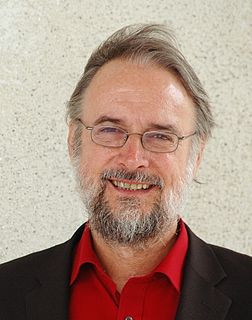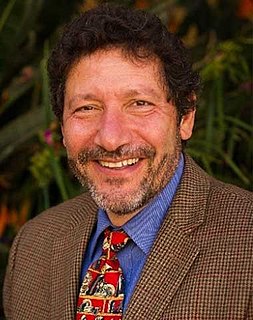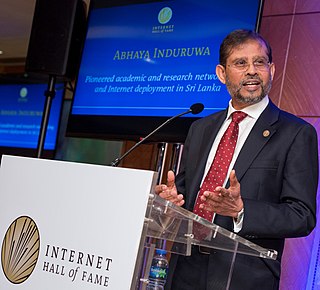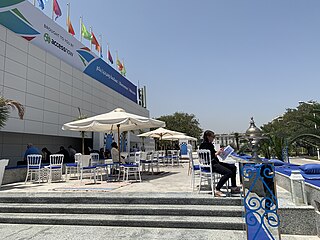
Karlheinz Brandenburg is a German electrical engineer and mathematician. Together with Ernst Eberlein, Heinz Gerhäuser, Bernhard Grill, Jürgen Herre and Harald Popp, he developed the widespread MP3 method for audio data compression. He is also known for his elementary work in the field of audio coding, the perception measurement, the wave field synthesis and psychoacoustics. Brandenburg has received numerous national and international research awards, prizes and honors for his work. Since 2000 he has been a professor of electronic media technology at the Technical University Ilmenau. Brandenburg was significantly involved in the founding of the Fraunhofer Institute for Digital Media Technology (IDMT) and currently serves as its director.
The Australian Communications and Media Authority (ACMA) is an Australian government statutory authority within the Communications portfolio. ACMA was formed on 1 July 2005 with the merger of the Australian Broadcasting Authority and the Australian Communications Authority.
Technology governance means the governance, i.e., the steering between the different sectors—state, business, and NGOs—of the development of technology. It is the idea of governance within technology and its use, as well as the practices behind them. The concept is based on the notion of innovation and of techno-economic paradigm shifts according to the theories of Joseph A. Schumpeter, Christopher Freeman, Carlota Perez, etc.
Telephone counseling refers to any type of psychological service performed over the telephone. Telephone counseling ranges from individual, couple or group psychotherapy with a professional therapist to psychological first aid provided by para-professional counselors. In-person therapists often advise clients to make use of telephone crisis counseling to provide the client with an avenue to obtain support outside of therapy if they cannot be reached in an emergency or at the conclusion of a therapeutic relationship.

The Malaysian Communications and Multimedia Commission is a regulatory body whose key role is the regulation of the communications and multimedia industry based on the powers provided for in the Malaysian Communications and Multimedia Commission Act 1998, the Communications and Multimedia Act 1998, and the Strategic Trade Act 2010. MCMC is similar to the National Telecommunications Commission (NTC) in the Philippines. Its role to implement and promote the Government's national policy objectives for the communications and multimedia sector. MCMC is also charged with overseeing the new regulatory framework for the converging telecommunications and broadcasting industries and online activities. In 2001, MCMC's role was expanded to include overseeing the postal service sector pursuant to the Postal Services Act 1991 and licensing of the Certification Authorities under the Digital Signature Act 1997.
Ashok Jhunjhunwala is an Indian academic. He received his B.Tech. from the Indian Institute of Technology, Kanpur and PhD from the University of Maine. He has been a faculty member at the Indian Institute of Technology Madras since 1981, where he is currently Institute Professor. During his career, he has contributed extensively to technology innovation and adoption in the Indian context.
Oxford Research Group (ORG) was a London-based charity and think tank at 244-254 Cambridge Heath Road, London, E2 9DA, working on peace, security and justice issues. Its research and dialogue activities were mainly focused on the Middle East, North and West Africa, as well as influencing UK and international security policy.

Cyber ethics is the philosophic study of ethics pertaining to computers, encompassing user behavior and what computers are programmed to do, and how this affects individuals and society. For years, various governments have enacted regulations while organizations have defined policies about cyberethics.
Brian D. Loader is currently Co-Director of the Centre for Political Youth Culture and Communication (CPAC) at the University of York, UK. Brian joined the Department of Sociology at York in January 2006 to pursue his scholarly interests into digital media communication and democratic governance. His overarching interest is in new media communications technologies, and the social, political and economic factors shaping their development and diffusion, and their implications for social, economic, political and cultural change. He has published widely in these areas and is the founding Editor of the international journal Information, Communication and Society whose aim and scope is to critically explore these issues in depth.

The Cyprus Safer Internet Helpline is a service provided by the Cyprus Safer Internet Center project, coordinated by the Cyprus Neuroscience and Technology Institute (CNTI). The Helpline ensures that not only children and adolescents but also adults have the opportunity to converse with experts in case they experience something negative on the Internet. Educated psychologists provide support and essential advice so that the crisis is overcome and the situation is confronted. Members of the public can reach the helpline at the number 7000 0 116. The communication is completely confidential and anonymous.

Childnet International is a registered UK charity that aims to make the internet a safe place for children and young people.

Halil Guven is a Cypriot-born professor, currently serving as the Dean of San Diego State University - Georgia. He was a Vice Dean of SDSU Georgia for four years before then and was one of the coordinators of the project at the time of its conception. Dr. Güven served as a Rector at three different universities in Turkey and in Cyprus. He served as the rector of Istanbul Bilgi University appointed in the academic year of 2009–2010, Eastern Mediterranean University (EMU), North Cyprus in 2004–2007, and Bahçeşehir University, Istanbul, Turkey in 1999–2003. He received his B.S. degree from Boğaziçi University, his M.S. degree from Mississippi State University on Fulbright Scholarship (1981), and his Ph.D. degree from University of Houston, in Mechanical Engineering(1983). Alongside his 20+ articles in energy systems in peer-reviewed journals, Güven has edited books and published book chapters on Globalization, Leadership, Clash of civilizations and Education. He speaks Turkish, English, and moderate Spanish and Greek.

Abhaya Induruwa is the inaugural Professor V K Samaranayake Endowed Professor of Computing, University of Colombo School of Computing, Sri Lanka. Having served as the Director of Cyber Innovation Hub he recently retired from the Canterbury Christ Church University in the United Kingdom where he researched into security and forensic investigation of Internet of Things (IoT). Currently he is engaged in promoting IoT in digital agriculture as a disruptive technology, primarily in developing countries, leading to smart agriculture resulting in higher yields in food production. Induruwa is considered the father of Internet in Sri Lanka.

Access Now is a non-profit founded in 2009 with a mission to defend and extend the digital civil rights of people around the world. Access Now supports programs including an annual conference on Human Rights (RightsCon), an index of internet shutdowns (#KeepItOn), and providing exit nodes for Tor network.
The Cyprus Conflict Resolution Trainers Group was founded in 1994 by about 30 Cypriot peace pioneers. Because this group has introduced conflict resolution and structured dialogue concepts to a few thousand Cypriots, it is credited for the formation of an embryonic peace movement.

Future Worlds Center (FWC) is a non-profit, non-Governmental independent organization active in programs with future orientation in areas related to positive social change, social entrepreneurship and transformation.

Global SchoolNet (GSN) is a nonprofit 501(c)(3) international educational organization that serves as a clearinghouse for collaborative educational projects, many that are based on the Constructivist Learning model. The organization coordinates projects and competitions focused on humanitarian issues, diplomacy, leadership, innovative teaching, entrepreneurship, STEM, and other academics for schools and youth organizations internationally. About 150,000 educators from 194 countries have registered as members of Global SchoolNet, and about 5.5 million students from 109 countries have participated in GSN projects as of 2020. Global SchoolNet is known for two international competitions, the International CyberFair for students in grades kindergarten through high school, and the U.S. State Department-sponsored Doors to Diplomacy for ages 12 through 19. Global SchoolNet was established in 1984 as Free Educational Mail (FrEdMail) in San Diego, California, where its headquarters still exists.
The Clean IT Project is an online project initiated by the European Union, aiming to reduce or discourage online terrorism and further illegal activities via the internet. They aim to create a document that commits the internet industry to help governments discover content that incites acts of terrorism. The main facilitators that undertook this project were the Netherlands, Germany, United Kingdom, Belgium, and Spain. There are many more supporting EU members such as Hungary, Romania, and recently, Italy, but the main countries that have started the project are the 5 listed above.
The Ministry of Communications and Information Technology (QATAR) (MCIT) is a Qatari ministry that was established within the new cabinet formation announced in June 2013 to be an extension of the Supreme Council of Information and Communication Technology that was established under Emiri Decree Law no. 36 of 2004.










